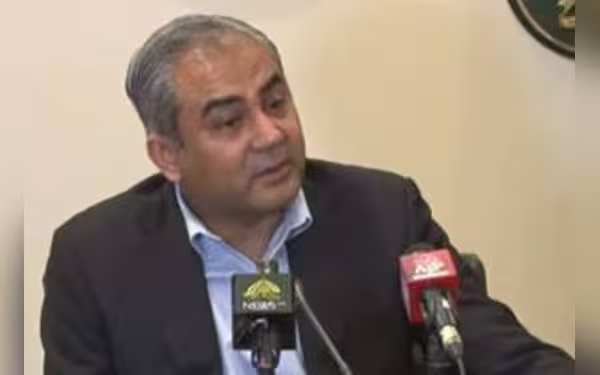Saturday, November 16, 2024 10:39 PM
Naqvi Warns PTM Against Parallel Judicial Systems in Khyber
- Federal government bans PTM over national security concerns.
- Naqvi emphasizes no parallel judicial systems allowed.
- Peshawar High Court issues restraining order against PTM.
 Image Credits: nation_pk
Image Credits: nation_pkFederal Minister Naqvi warns PTM against parallel judicial systems as tensions rise in Khyber Pakhtunkhwa.
In recent developments, the federal government of Pakistan has taken a firm stance against the Pashtun Tahafuz Movement (PTM), a group that has been at the center of controversy regarding its activities and rhetoric. The PTM, which advocates for the rights of Pashtuns, was banned on October 6, 2023, due to concerns over national peace and security. This decision has sparked significant debate and concern among various stakeholders, particularly as the PTM planned to hold a gathering known as the ‘Pashtun Qaumi Jirga’ in Khyber Pakhtunkhwa.
Federal Interior Minister Mohsin Naqvi addressed the media, emphasizing that the government would not allow any parallel judicial systems to operate within the country. He stated, “On the one hand, the gathering is being referred to as a jirga and on the other hand, it is being referred to as a court.” This statement underscores the government's position that such gatherings could undermine the established legal framework of Pakistan.
Despite the ban, the PTM proceeded with its plans for a three-day grand jirga, scheduled to commence on October 11 in the Khyber district. The Khyber Pakhtunkhwa government had already prohibited its officials from engaging with the PTM, indicating a unified front against the organization. Minister Naqvi clarified that while traditional jirgas, which are community-based dispute resolution gatherings, are acceptable, a large assembly of thousands of people claiming judicial authority is not.
Naqvi further elaborated on the reasons behind the PTM's ban, citing its alleged divisive rhetoric against state institutions and the police. He remarked, “You talk about dividing the nation by promoting ethnicity,” highlighting the government's concern over the potential for increased ethnic tensions. The minister also pointed out that leaders from major political parties had met with PTM representatives but made it clear that they would not support any calls for violence.
In a significant legal move, the Peshawar High Court issued a restraining order against the PTM, preventing them from holding the ‘Pashtun Qaumi Adalat’ on disputed land. The court's decision reflects the legal complexities surrounding the PTM's activities and the ongoing tensions in the region. The case has been adjourned until October 15, allowing for further legal examination.
As the situation unfolds, it is crucial to consider the broader implications of the government's actions against the PTM. While the government asserts that it is acting in the interest of national security, the PTM and its supporters argue that their rights are being suppressed. This conflict raises important questions about the balance between maintaining order and respecting the rights of citizens to assemble and express their views.
The ongoing tensions between the PTM and the federal government highlight the delicate nature of governance in Pakistan, particularly in regions with complex ethnic dynamics. As the legal proceedings continue and public sentiment evolves, it remains to be seen how this situation will impact the future of political discourse and civil rights in the country. The need for dialogue and understanding is more pressing than ever, as both sides navigate the challenges of a rapidly changing political landscape.













